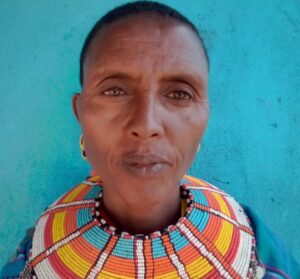
Agnes Lekupe, BOMA entrepreneur
Over the last few months, Agnes Lekupe has been especially concerned about her children.
“With everyone at home during COVID-19, teen pregnancies are on the rise,” she says. “I spend a lot of time talking to my four daughters about the importance of studying hard. I tell them not to mix with bad company. I tell them to focus on the future.”
Agnes is apprehensive. And yet, she is optimistic. Her daughters tell her she worries too much. They tell her that they see her mother as a role model.
Agnes is from Samburu county in Northern Kenya. It is an area of the world devastated by climate change. Heightened cycles of droughts and floods have wrecked the local grazing lands. Men can be gone for months upon months in pursuit of pasture. Women are left behind with children in villages with little or no access to capital.
During the last drought that began in 2015, Agnes too was left to fend for herself and her children. She relied on selling local brews and snuff to make money. Income was unreliable.
“Some days were good. But most days were bad. My children often went to bed hungry.”
Agnes enrolled as an entrepreneur with the BOMA Project. BOMA provided Agnes with seed capital to start a new business. BOMA’s mentors provided her with business and life-skills training.
Financial training sessions covered areas like supply and demand, profit and pricing, record keeping, and marketing. Life-skills sessions included household decision-making, the importance of educating children (especially girls), family planning, and the rights of women under the Kenyan constitution.
Agnes started up a business trading livestock. Before BOMA, many women weren’t allowed to trade livestock in their communities. Today, over 40% of women in a livestock market are women — many of whom employ men!
In the beginning, business was good. The business group consisting of Agnes and two other women entrepreneurs started off with a few goats. Today, they have more than forty goats.They also opened a convenience store to supplement their income.
Agnes made sufficient money to move her family and children out of poverty. She was able to purchase school uniforms, pay school fees and send her children to school. She was able to move her family out of extreme poverty. She was beginning to feel hopeful about the future.
And then the coronavirus pandemic hit.
Keeping the lights on during COVID-19
To prevent the spread of the pandemic, the Kenyan government ordered the closure of the livestock markets. The income from Agnes’ primary livestock business dried up.
“Luckily we had the convenience store,” Agnes says. “I thank BOMA’s mentors who encouraged me to start a secondary business. I feel lucky that I didn’t put all my eggs in one basket.”
Income from the convenience store was reliable. However, it wasn’t nearly enough. Prices of food commodities had shot up after the pandemic — at a time when she had more children at home. Agnes was increasingly stretched to come up with ways to meet all the household and school expenses.
BOMA’s market linkages team connected Agnes to Kenya’s National Agricultural and Rural Inclusive Growth Project (NARIGP). NARIGP, which is funded by the Government of Kenya and the World Bank, is supporting communities to increase agricultural productivity. Agnes was voted in as a village committee member for two NARIGP projects in Samburu County. The first project involved building a shed to rear chickens, while the second grant will be used to purchase goats for fattening and selling.
With the new opportunities, Agnes is able to generate additional income. She is able to survive the economic shocks of COVID-19.
Agnes’s election as a village committee member speaks volumes of the way she has evolved into a leader.
“My fellow women chose me as a chair lady in our savings group after an election because they saw the characteristics of a leader in me,” she says.
